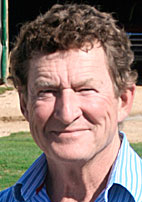Contributor Profiles

Writer
Michael T. Collins
Veterinary microbiologist and award-winning teacher, I have devoted most of my 40-year professional career to the study of paratuberculosis, also known as Johne’s disease, caused by Mycobacterium avium subspecies paratuberculosis (MAP). My veterinary training (DVM) was done at the University of Minnesota and I received a Ph.D. in microbiology from the University of Georgia, followed by board certification by the American College of Veterinary Microbiologists.
Presently I am a professor in the Department of Pathobiological Sciences, School of Veterinary Medicine at the University of Wisconsin in Madison. Specializing on paratuberculosis has led to authorship of over 100 scientific and lay publications on Johne's disease. I also served as president of the International Association for Paratuberculosis for over 10 years. I strive to help disseminate high quality and useful information through the Johne’s Information Center website http://johnes.org
Over my academic career I’ve taken four year-long sabbaticals for study in Denmark, Australia, The Netherlands, and, most recently, in Chile as a Fulbright Scholar. Other notable awards include the Van Hise Distinguished Teaching & Outreach Award from the University of Wisconsin-Madison, the Norden-Pfizer Teaching Award from the University of Wisconsin School of Veterinary Medicine, and the Distinguished Research Alumnus Award from the University of Minnesota.
Food-producing animals
Although raised as a “city kid” in St. Paul, Minnesota, I have had a long-standing interest in animals used to produce food. This is possibly traced back to time spent on the farms of my Swedish relatives in northern Minnesota. My research interest started with jobs assisting researchers as I worked my way through veterinary school. These two interests, food-producing animals and research, were melded in my microbiology degree. I’ve studied bacterial diseases of fish, sheep, pigs, goats and cattle. I have also worked on the human disease known as Legionnaires’ disease during my sabbatical at Rigshospitalet, located in Copenhagen and one of the largest educational institutions in Denmark, specializing in medical science programs.
My fascination with paratuberculosis allows me to move between the laboratory bench, working on better diagnostic tests, and the dairy barn where I can help farmers use practical methods to control this disease. The ultimate solution to the problem of MAP in humans is to rid food-producing animals of MAP infections. Now, at the pinnacle of my career, it is toward this end that I am focused. This quest engages my skills in microbiology, my concern for animal health and welfare, as well as my passion for teaching.
